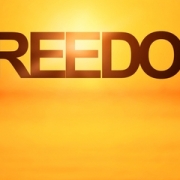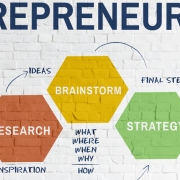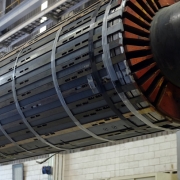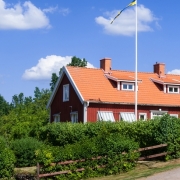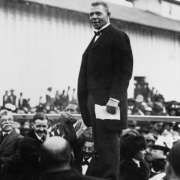In the iconic movie starring Jack Nicholson, One Flew Over the Cuckoo’s Nest, one of the most unforgettable villains in movie history was portrayed brilliantly by Louise Fletcher – the infamous Nurse Ratched. Based on the novel by Ken Kesey, Nurse Ratched was, and continues to be, a brilliant metaphor for the corrupting influence of institutional power.
A contemporary version of Nurse Ratched is Georg Kell, the Founding Director of the UN Global Compact. He also proclaims himself “Chairman of an ESG quant fund using big data to assess the performance and sustainability of globally listed companies.” ESG is an acronym for Environment, Social Justice, and Governance. According to Kell’s 2018 Forbes article, “ESG investing is estimated at over $20 trillion in AUM or around a quarter of all professionally managed assets around the world.”
From the UN, to its over 9000 corporate signatories in 160 countries, to the largest asset managers in the world including Blackrock, Kell is aptly portrayed as movie reviewer Pauline Kael described Nurse Ratched,
Nurse Ratched’s soft, controlled voice and girlishly antiseptic manner always put you in the wrong; you can’t cut through the crap in her—it goes too deep. And she’s too smart for you; she’s got all the protocol in the world on her side.
Fortunately, Western Civilization has an eloquent defender in Poetic Justice Warrior Donald Boudreaux. The George Mason University economics professor also has a clear, and morally defensible understanding of ESG issues. For a small sample of civilized perspective, consider his Washington Examiner article, Earth Day 2018 – Celebrate A World Cleaned by Capitalism,
Once you notice bacterial pollution is abated by free markets, you notice our lives are cleaned by capitalism. Hard roofs and floors were made possible only by capitalism, which greatly reduced the costs of these marvels.
This could never happen by the decree of any central planning authority, and today’s post industrial world is no exception. Boudreaux explains,
Looking only at the downsides of global capitalism makes it appear to be a threat to humanity. But when the upsides are brought into view, modern capitalism is not only a source of great material abundance, but a cleanser of the human environment.
Regarding social justice mandates, Kell and his corporate cronies are demanding “diverse” ownership groups, boards of directors, and management teams. None of the this addresses the utter failure of previous affirmative action programs. In fact, they are nothing more than the evolution of their forced busing in the 1970s and subjective college admissions standards that began in the 1980s.
In February 2020, Boudreaux wrote in his column There Is No App for Social Engineering,
The people who bear the costs of interventions are ordinary Americans. Making matters worse, failed government programs don’t reveal themselves as failures. Compelled to pay, citizens can’t easily express their dissatisfaction. Damaging programs often survive.
Yet Kell believes there is an app for everything, particularly if it’s a self-fulfilling prophecy he can control and exploit for personal gain. That is how ESG investing works. By establishing arbitrary, subjective, politically correct, and politically enforceable standards for corporate governance, there is money to be looted. As he explains in his The Remarkable Rise of ESG Investing article,
“I also oversaw the creation of UN Global Compact’s sister initiatives – Principles for Responsible Investment, Principles for Responsible Management, and Sustainable Stock Exchanges.” For Kell’s ilk, their goal is to generate momentum for reinventing capitalism, make a few bucks on the side, and he’s got an app for that. His Arabesque quant fund is,
A global asset management firm at the cutting edge of AI and sustainability research. Momentum based investment generates a consistent return over a full market cycle, harnessing market opportunities from a return and diversification standpoint.
Capitalism infuriates central planning elites because it renders them irrelevant. They can’t have that. Their opinion of free markets, entrepreneurs, and human nature was best explained by Nurse Ratched when discussing her new patient, Randle McMurphy,
No. He isn’t extraordinary. He is simply a man and no more, and subject to all the fears, cowardices and timidity that any other man is subject to. Given a few more days, he will prove this, to us as well as the rest of the patients.
Or the rest of the world. In 2020, Wall Street behemoth Blackrock is proving her right. The world’s largest asset manager is sanctioning its own victimhood by caving to Kell’s ESG pressure tactics. According to Rupert Darwall, in his May 2020 City Journal article titled Bad Day at Blackrock?, “ESG investing is already taking a toll on state pension funds—now it might transform the world’s largest private asset manager, too.”
For the common good. ESG investing will infuse the political way of enlightened force into the economic way of voluntary trade in order to prevent us from harming ourselves. One example is the market for opioids, to which Boudreaux writes for the Foundation for Economic Education,
Far worse than drug abuse is power abuse, fueled by the notion that it’s okay to butt into each other’s affairs through the agency of the state. I emphatically reject the notion the agency of the state transforms unjust actions into just actions.
Enter JUST Capital, “We believe that business can and must be a greater force for good and that markets must be part of the solution.” The arrogance and ignorance of this statement is mind boggling. But in a perverted way, it almost makes sense. The progressive dogma of the last 100 years has demonized business and markets.
Yet there is nothing in the JUST Capital models to account for the virtues of productivity, prices, and profits. Those have been replaced with polling, power, and programmatic initiatives. Really. You can’t make this up.
In the face of this insanity, Boudreaux is never at a loss for words. As a principled advocate for the genius of free markets, he liberally borrows the classic ideas of the freedom movement for his indispensable blog, Cafe Hayek. Here he quotes AIER columnist Max Gulker on the importance of market forces in solving the Wuhan virus supply-side disaster,
Reopening firms are not simply central planners with smaller jurisdictions. Best practices emerge in this new landscape. They observe price signals, make mistakes, and adjust countless times. The process of competition, central planners can’t replicate.
The Climate Leadership Council is another group of Nurse Ratcheds saving the patients in the psychiatric ward from themselves, this time with their carbon dividend plan.
The first pillar is a tax on carbon dioxide emissions at the mine, well, or port. A sensible carbon tax might begin at $40 per ton and increase steadily over time. All the proceeds would be returned to the American people on an equal basis.
This presumes that someone is going to use these hydrocarbons in the future to create wealth, which someone will. It has worked that way since humans began burning wood. It’s an amazing, life enhancing process. Yet the carbon dividend scheme avoids reality, as Boudreaux explains in I Would Be Richer If I Owned Your Assets,
One cannot separate the existence of the asset from the individuals and the processes that bring the asset into existence. Assets do not create themselves. The creation of each productive asset requires savings, creativity, risk-taking, and actual effort.
It also presumes “the American people” are a monolithic group of dimwits willing to accept higher energy prices because Nurse Ratched laments, “You know Billy, what worries me is how your mother is going to take it.” You don’t want to ruin the planet for your mother, do you Billy?
